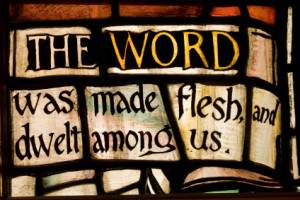 A reader recently sent a a series of questions about the experience of Jesus on the cross. I have answered most of the questions in previous posts (since the list below). In this post I will address the question about what Jesus meant when He said, “My God, My God, why have You forsaken Me?”
A reader recently sent a a series of questions about the experience of Jesus on the cross. I have answered most of the questions in previous posts (since the list below). In this post I will address the question about what Jesus meant when He said, “My God, My God, why have You forsaken Me?”
Here is the question the reader originally submitted:
I am a believer, but I am troubled by an atheist’s questions. I was talking to an atheist the other day, and he said that God doesn’t know what it’s like to lose a son because he knew all along that Jesus would rise in three days, so he only lost him for the weekend! He also questioned that if God is Jesus, why did he beg to be saved from the cross when he was in the garden? Also, shouldn’t Jesus already have known he would rise again in three days? Why did he ask God, “Why have you forsaken me?” Wouldn’t he know that he’s only going to be dead three days?
Since this is such a complex set of questions, I am answering them in four posts:
- How to Answer Questions of Atheists
- 2 Traditional Explanations for How God knows what it is Like to Lose a Son (both of which I reject)
- 2 Ways God Knows What it is like to Experience the Death of a Child
- Why did Jesus say, “My God, My God, why have You forsaken Me?”
The first three posts covered most of the issues, but there are two main questions left.
First, why did Jesus beg to be saved from the cross when He was in the garden? Second, why did He ask God, “Why have You forsaken Me?”?
That first unanswered question I have already attempted to answer in a previous post where I talked about the phrase, “Let this cup pass from me.” Though my interpretation of that statement by Jesus in the garden is somewhat controversial, it seems to make the most sense out of the context, and Jesus’ attitude leading up to the cross. I do not think Jesus was praying for a way out of the pain and suffering; His love for humanity was too great for that. No, I think Jesus was praying for strength to face the pain and suffering He knew He was about to bear.
So I am not going to write anything more about that here.
Let us focus instead on the statement of Jesus from the cross where He cried out, “My God, My God, why have You forsaken Me?”
Why Have You Forsaken Me?
This question from Jesus on the cross is found in Matthew 27:46-47 (and in Mark 15:34), and is a quotation from Psalm 22:1. It is asked by Jesus as He suffers on the cross, and faces the sin of the world being poured out upon Him.
 The main point of the question above is that since both Jesus and God the Father knew that God would raise Jesus from the dead (Matt 12:40), in what sense what Jesus forsaken by God?
The main point of the question above is that since both Jesus and God the Father knew that God would raise Jesus from the dead (Matt 12:40), in what sense what Jesus forsaken by God?
In other words, if being forsaken means to be abandoned, rejected, despised, how could Jesus say, “Why have you forsaken me?” when He knew that He would be raised from the dead, and therefore, not ultimately forsaken, that is, not really abandoned, rejected, or despised?
The answer, I think, lies in understanding to some degree the eternal relationship that has existed between God the Father and God the Son. Understanding this relationship, and the cry of Jesus from the cross, leads to a shocking idea (for me, anyway) about the experience of Jesus on the cross.
His Eternal Relationship seemed Broken
Since God the Father and God the Son have existed in an eternal relationship, they had never been separated by anything for any length of time in any way, shape, or form. Nothing had ever come between them the way of will, desires, intentions, thoughts, or purposes.
We humans have a difficult time grasping this, since we don’t know what it is like to live in such a relationship at all, let alone for all eternity. All of relationships, even those that are the most loving, have areas of discord and misunderstanding.
But God the Father and God the Son (along with God the Holy Spirit) always lived in a perfect relationship and perfect unity.
Yet when Jesus went to the cross, He took the sins of all people, throughout all time, upon Himself. He bore our sins in His own body (1 Pet 2:24). He who knew no sin, became sin for us (2 Cor 5:21). He became a curse for us (Gal 3:13).
I believe that from the perspective of Jesus on the cross, it seemed that God had “abandoned” Him to sin.
Though sin cannot damage or pollute God in any way, sin does cause a separation between Himself and the sinner. It appears that when Jesus took the sin of all people upon Himself, a separation came between Him and God that had never before existed.
So when Jesus cried out, “Why have you forsaken me?” it was because He was experiencing a brokenness in His relationship with God the Father that they had never before experienced. Yes, He knew that God had not finally and ultimately forsaken Him, and He knew that He would be raised again in three days, but the cry of Jesus from the cross is not about those things, but about the separation from God He experienced for the very time in all eternity.
 This experience of separation from God elicited the cry of Jesus, “My God, My God, why have you forsaken me?” He had never experienced this separation before, and though He knew that He would be reunited with God in a short while, the pain and agony of the separation was caused this cry of despair from Jesus.
This experience of separation from God elicited the cry of Jesus, “My God, My God, why have you forsaken me?” He had never experienced this separation before, and though He knew that He would be reunited with God in a short while, the pain and agony of the separation was caused this cry of despair from Jesus.
But had God truly forsaken Jesus? I don’t think so. I don’t think God did forsake Jesus any more than God forsakes us. Jesus was not a God-forsaken God.
The God-Forsaken God?
I might be going out too far on a theological limb here, but there is a part of me that thinks it is only here on the cross where Jesus finally experienced the pain and turmoil of what it is like to be a sinful human being separated from God. Though Jesus came as a human being to rescue us from our sinful plight and in so doing, experienced almost everything He could as a human, He never really experienced the fearful and agonizing predicament of being separated from God by sin.
It was only when He took our sin upon Himself on the cross, it was only when the crushing despair of being separated from God came upon Him, that He finally felt what we humans have lived with since we were born. The pain and anguish we feel every day, the suffering of being separated from God that has so numbed our souls, the despair and fear that drives us to live as we do, was felt for the very first time by Jesus on the cross when sin came upon Him.
His cry, “My God, my God, Why have You forsaken Me?” is not the cry of the God-forsaken God, but is the heart cry of every single human being on earth. It is the cry we have been voicing since the beginning when we fell into sin.
And finally, God came to earth in Jesus Christ to experience this separation for Himself. And when He did, the suffering is so great, He cries out, “My God, my God, Why have you forsaken me?”
Do you see? This is not just the cry of Jesus on the cross. This is the cry of every single person on earth.
It is our pain, our fear, our hurt, our despair, finally being given a voice. It is the cry of God fully entering into our broken condition and fully experiencing the sense of separation from God that sin causes, and crying out in anguish and despair over this sense of loss, “My God, my God, why have You forsaken me?”
When we feel that God is ignoring us, or has abandoned us, Jesus knows what we feel, and He cries out to God on our behalf, “Why have You forsaken Me?”
When we experience fear in the night about our future, Jesus knows what we feel, and He cries out to God on our behalf, “Why have You forsaken Me?”
When bad things happen in this world, and we wonder what God is doing about them (if anything), Jesus knows what we feel, and He cries out to God on our behalf, “Why have You forsaken Me?”
When we feel despised and rejected, abused and slandered, misunderstood and forgotten, and we wonder why God seems to be doing nothing to protect and defend us, Jesus knows what we feel, and He cries out to God on our behalf, “Why have You forsaken Me?”
The separation from God that Jesus experienced on the cross is the separation from God that humans experience every day. Certainly, since He is God and since He bore every sin of every person, He experienced this separation to an infinite degree. But still, the cry of Jesus from the cross, “My God, my God, why have You forsaken Me?” is not just the cry of Jesus, but is our cry.
It is the cry of every single human being on earth. Jesus was giving voice to our pain and anguish.
Do you feel abandoned by God? Jesus knows what that feels like. Do you feel forsaken, neglected, forgotten, and overlooked? Jesus knows what that feels like. Do you feel like God has turned His back? Jesus knows what that feels like.
But here is the thing…
The original question was “How can Jesus say ‘Why have you forsaken me?’ when God did not actually forsake Him?”
Yes. And just as Jesus felt what we all feel to be forsaken, so also, none of us have been forsaken, just as Jesus Himself was not.
Though you may feel abandoned by God, you are no more abandoned than was Jesus. Though you may feel forsaken, forgotten, neglected, and overlooked, these things are no more true of you than they were of Jesus. Though you may feel unloved, this is no more true of you than it was for Jesus.
Though Jesus cried out, “Why have you forsaken me?” He was NOT forsaken. And neither are we.
This is a feeling that Jesus experienced, which is a feeling we ALL experience.
And this feeling does not come because we are forsaken, but because of sin. Sin has separated us from God; it has not separated God from us. This is why God had to reconcile the world to Himself (1 Cor 5:19). He didn’t need to reconcile Himself to the world, for He never left or abandoned us.
Though we may feel forsaken, we are not forsaken any more than Jesus was forsaken.
God did not forsake Jesus, and God does not forsake us. The presence of sin in our lives makes us feel like we are forsaken, like God has abandoned us, forgotten us, or left us alone to suffer and die, when in fact, God is right there all the time, holding us, loving us, and crying with us over our pain.
It is sin that makes us feel separated from God, and this is the feeling Jesus expressed on the cross, and is one reason Jesus went to the cross – to take our sin and bear it away into death so that we can see that God has not left us, has not abandoned us, and has not forsaken us, but has fully entered into our pain, our suffering, and even into our sin, so that He might show us how much He loves and cares for us. This truth is explained in more detail in my new book, The Atonement of God.
I am not sure if this answers the reader’s question, but it does help explain what Jesus meant when He said, “My God, my God, why have You forsaken Me?” It also helps us understand that on the cross, Jesus understood the feeling of being a sinful human being, and it is for this reason that we can trust His promise that He will never leave us nor forsake us (Heb 13:5).
The cross of Jesus is CENTRAL to everything!
Transform your life and theology by focusing on the crucifixion and resurrection of Jesus:
Fill out the form below to receive several emails from me about the death and resurrection of Jesus.
(Note: If you are a member of RedeemingGod.com, login and then revisit this page to update your membership.)




 Quite to the contrary, it could be argued that in the death of Jesus, God experienced greater loss, greater pain, and greater suffering than do human parents.
Quite to the contrary, it could be argued that in the death of Jesus, God experienced greater loss, greater pain, and greater suffering than do human parents.  And when death strikes, God is there, grieving and mourning over the death of yet another child.
And when death strikes, God is there, grieving and mourning over the death of yet another child. 
 Sometimes this question is asked this way: “How could God know what it is like to lose a son if He knew Jesus was just going to rise from the dead three days later?” Or “How could the death of Jesus be a sacrifice for God if God knew that Jesus was just going to rise again from the dead?”
Sometimes this question is asked this way: “How could God know what it is like to lose a son if He knew Jesus was just going to rise from the dead three days later?” Or “How could the death of Jesus be a sacrifice for God if God knew that Jesus was just going to rise again from the dead?” Though I was taught in Bible college and Seminary that God is timeless, that He exists outside of time in a constant, eternal now, I don’t believe it. There are numerous reasons why, which I won’t get into here. I believe that God is relational and is capable of reacting to our needs and prayers in a way that would not be possible if He were outside of time.
Though I was taught in Bible college and Seminary that God is timeless, that He exists outside of time in a constant, eternal now, I don’t believe it. There are numerous reasons why, which I won’t get into here. I believe that God is relational and is capable of reacting to our needs and prayers in a way that would not be possible if He were outside of time.
 The death of Jesus on the cross is the pinnacle and apex of the incarnation. It is His most triumphal moment. Which of us would seek to take it from Him and say, “No, no! Jesus! You cannot die a criminal’s death! You are innocent! That is only for guilty people. You must live! You must rule! You must reign! You must act like God!”
The death of Jesus on the cross is the pinnacle and apex of the incarnation. It is His most triumphal moment. Which of us would seek to take it from Him and say, “No, no! Jesus! You cannot die a criminal’s death! You are innocent! That is only for guilty people. You must live! You must rule! You must reign! You must act like God!”
 Forget for a moment that you live 2000 years after the death of Jesus Christ on the cross, and forget that you have the New Testament which tells you about who Jesus was and what He did. Imagine that you pick up an ancient history book and it tells you about three men who were put to death around 33 BC for religious and political crimes. Two of them were criminals and one was a rabble-rouser, a trouble-maker, and a blasphemer. If you knew nothing else about these three men, you would assume they were most likely guilty.
Forget for a moment that you live 2000 years after the death of Jesus Christ on the cross, and forget that you have the New Testament which tells you about who Jesus was and what He did. Imagine that you pick up an ancient history book and it tells you about three men who were put to death around 33 BC for religious and political crimes. Two of them were criminals and one was a rabble-rouser, a trouble-maker, and a blasphemer. If you knew nothing else about these three men, you would assume they were most likely guilty.
